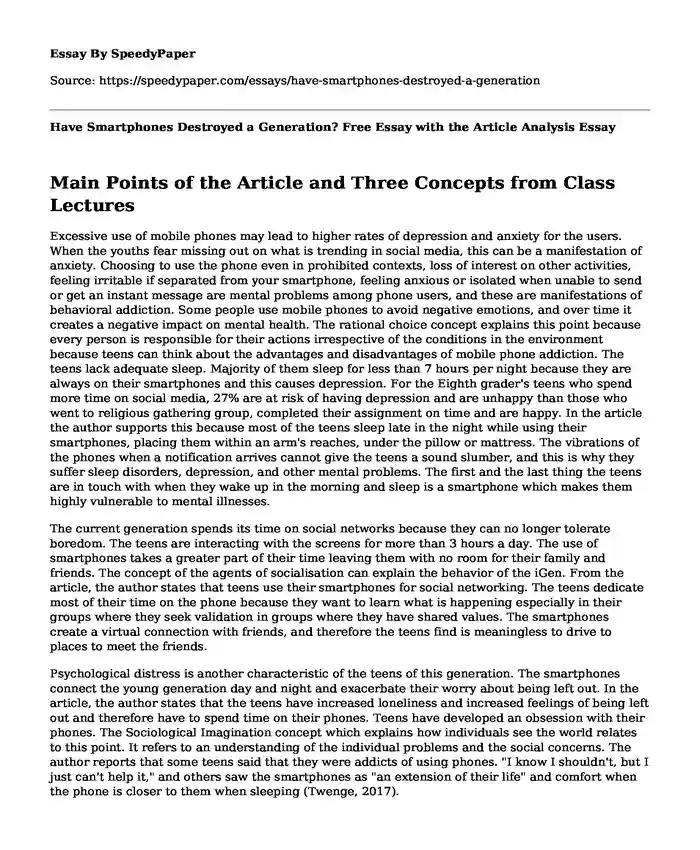
| Type of paper: | Essay |
| Categories: | Social networks Information technologies Social media |
| Pages: | 3 |
| Wordcount: | 700 words |
Main Points of the Article and Three Concepts from Class Lectures
Excessive use of mobile phones may lead to higher rates of depression and anxiety for the users. When the youths fear missing out on what is trending in social media, this can be a manifestation of anxiety. Choosing to use the phone even in prohibited contexts, loss of interest on other activities, feeling irritable if separated from your smartphone, feeling anxious or isolated when unable to send or get an instant message are mental problems among phone users, and these are manifestations of behavioral addiction. Some people use mobile phones to avoid negative emotions, and over time it creates a negative impact on mental health. The rational choice concept explains this point because every person is responsible for their actions irrespective of the conditions in the environment because teens can think about the advantages and disadvantages of mobile phone addiction. The teens lack adequate sleep. Majority of them sleep for less than 7 hours per night because they are always on their smartphones and this causes depression. For the Eighth grader's teens who spend more time on social media, 27% are at risk of having depression and are unhappy than those who went to religious gathering group, completed their assignment on time and are happy. In the article the author supports this because most of the teens sleep late in the night while using their smartphones, placing them within an arm's reaches, under the pillow or mattress. The vibrations of the phones when a notification arrives cannot give the teens a sound slumber, and this is why they suffer sleep disorders, depression, and other mental problems. The first and the last thing the teens are in touch with when they wake up in the morning and sleep is a smartphone which makes them highly vulnerable to mental illnesses.
The current generation spends its time on social networks because they can no longer tolerate boredom. The teens are interacting with the screens for more than 3 hours a day. The use of smartphones takes a greater part of their time leaving them with no room for their family and friends. The concept of the agents of socialisation can explain the behavior of the iGen. From the article, the author states that teens use their smartphones for social networking. The teens dedicate most of their time on the phone because they want to learn what is happening especially in their groups where they seek validation in groups where they have shared values. The smartphones create a virtual connection with friends, and therefore the teens find is meaningless to drive to places to meet the friends.
Psychological distress is another characteristic of the teens of this generation. The smartphones connect the young generation day and night and exacerbate their worry about being left out. In the article, the author states that the teens have increased loneliness and increased feelings of being left out and therefore have to spend time on their phones. Teens have developed an obsession with their phones. The Sociological Imagination concept which explains how individuals see the world relates to this point. It refers to an understanding of the individual problems and the social concerns. The author reports that some teens said that they were addicts of using phones. "I know I shouldn't, but I just can't help it," and others saw the smartphones as "an extension of their life" and comfort when the phone is closer to them when sleeping (Twenge, 2017).
Possible Changes to Public Policy by the Author
From the article, the author suggests that the teens should have minimal contact with the screens and participate in activities like sports that do not involve the use of screens. The government should ban cell phones at school so that students focus on their studies. Also, persons caught cyberbullying must face harsh punishment to deter the behavior. The government should also ensure that the standard of the mobile devices is high to reduce the risks associated with the cause of cancers from the electromagnetic waves and poor screens that may cause eyesight problems.
References
Twenge, J. M. (2017). Have smartphones destroyed a generation? The Atlantic.
https://www.istockphoto.com/photo/multiracial-group-of-people-with-cellphones-gm503482104-82545639
Cite this page
Have Smartphones Destroyed a Generation? Free Essay with the Article Analysis. (2022, Mar 25). Retrieved from https://speedypaper.net/essays/have-smartphones-destroyed-a-generation
Request Removal
If you are the original author of this essay and no longer wish to have it published on the SpeedyPaper website, please click below to request its removal:
- Free Essay Sample on SME's Growth Management
- Free Essay on Dealing with Conflict and Managing Tensions in Interpersonal Relationships
- Essay Sample on Minority Health Status in the US
- Why Do We Believe? Find the Answer in a Free Essay
- Free Paper Sample on Implications of Summer 2020 Olympic Games in Tokyo, Japan
- A New Journey: Arriving at Yale Five Years Ago
- Free Essay. Suffragette Movement in the UK in the Early 1900s
Popular categories




